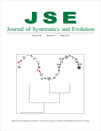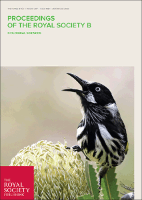
BMC Ecology and Evolution
Scope & Guideline
Exploring the intricate dance of ecology and evolution.
Introduction
Aims and Scopes
- Ecological and Evolutionary Processes:
The journal emphasizes research that explores the mechanisms and processes underlying ecological interactions and evolutionary changes, including speciation, adaptation, and community dynamics. - Biodiversity and Conservation:
A significant focus on the conservation of biodiversity, addressing ecological impacts of human activities, climate change, and habitat loss, while proposing strategies for effective management and preservation of ecosystems. - Phylogenetics and Genomics:
Research that employs phylogenetic and genomic analyses to unravel evolutionary relationships, genetic diversity, and the evolutionary history of species across various taxonomic groups. - Functional Ecology:
Investigations into how organisms interact with their environment and the functional traits that influence their survival, reproduction, and ecological roles. - Cross-disciplinary Approaches:
Encourages integration of ecological, evolutionary, genetic, and biogeographical data, often utilizing advanced technologies such as environmental DNA (eDNA) and genomic sequencing.
Trending and Emerging
- Environmental DNA (eDNA) Applications:
The use of eDNA for biodiversity monitoring and conservation is gaining traction, allowing researchers to detect and study species in diverse environments without physical sampling. - Climate Change Impacts:
Research addressing the effects of climate change on species distribution, adaptation, and ecosystem dynamics is increasingly prominent, highlighting the urgent need to understand and mitigate these impacts. - Microbiome Studies:
The exploration of microbiomes and their influence on host ecology and evolution is emerging as a significant theme, linking microbial diversity with broader ecological and evolutionary processes. - Adaptive Evolution and Phenotypic Plasticity:
There is a growing focus on how species adapt to environmental changes through phenotypic plasticity and genetic evolution, providing insights into resilience and survival strategies. - Conservation Genomics:
As conservation efforts become more data-driven, the integration of genomic tools to assess genetic diversity and inform conservation strategies is increasingly emphasized.
Declining or Waning
- Traditional Taxonomy:
There has been a noticeable decline in studies solely focused on traditional taxonomy without integrating molecular or ecological approaches, as the field moves towards more holistic and integrative methodologies. - Historical Ecology:
Research focusing exclusively on historical ecology, while still relevant, appears to be less frequent as the journal increasingly prioritizes contemporary ecological and evolutionary challenges. - Single-species Studies:
Papers focusing on single species without consideration of broader ecological or evolutionary contexts are becoming less common, as the emphasis shifts towards understanding interactions within ecosystems.
Similar Journals

ZOOLOGICA SCRIPTA
Pioneering research in zoology and molecular biology.Zoologica Scripta, published by Wiley, stands as a distinguished journal within the fields of Animal Science and Zoology, Ecology, Evolution, Behavior and Systematics, Genetics, and Molecular Biology. With its inception dating back to 1971 and a convergence year extending to 2024, this journal consistently provides a platform for high-quality research, earning a Q1 ranking in two key categories and solid performance in additional fields, as evidenced by its significant Scopus rankings and impressive percentiles. Notably, it ranks 36 out of 490 journals in Animal Science and Zoology, placing it in the 92nd percentile. While Zoologica Scripta operates under a traditional access model, its rigorous peer-review process ensures that only the most impactful studies make their way into its pages. With a focus on advancing our understanding of biodiversity and evolutionary processes, this journal is indispensable for researchers, professionals, and students committed to the ongoing exploration of animal sciences and ecological studies.

Theoretical Ecology
Transforming ecological studies through theoretical excellence.Theoretical Ecology, published by SPRINGER HEIDELBERG, is a premier journal in the field of ecological modeling and theory, exemplifying the intersection of rigorous quantitative analysis and ecological understanding. With its ISSN 1874-1738 and E-ISSN 1874-1746, this journal has been a valuable resource for researchers since its inception in 2008, with a commitment to publish cutting-edge research until 2024. The journal's 2023 category quartiles demonstrate its impact, ranking Q3 in Ecological Modeling and Q2 in Ecology, reflecting its significance within the academic community. Furthermore, its Scopus rankings position it among the top tier of environmental science journals, ranking #181/461 in Ecology and #21/41 in Ecological Modeling. While the journal does not offer open access, it is an essential publication for those looking to deepen their understanding of theoretical frameworks that drive ecological research and practice. By providing a platform for innovative theories and models, Theoretical Ecology plays a crucial role in shaping future ecological studies and informing policy decisions in environmental management.

Frontiers in Ecology and Evolution
Pioneering research at the intersection of ecology and evolution.Frontiers in Ecology and Evolution, published by FRONTIERS MEDIA SA, stands as a premier open-access journal dedicated to the exploration and discourse in the interdisciplinary fields of ecology and evolutionary biology. With its inception in 2013, this journal has rapidly ascended to a prestigious position, securing a Q1 ranking in both Ecology and Ecology, Evolution, Behavior and Systematics categories, reflecting its influential impact in the respective fields. Operative from Switzerland, Frontiers in Ecology and Evolution enables researchers, professionals, and students to access high-quality research without barriers, promoting collaboration and innovation. The journal covers a broad range of topics, from ecological dynamics to evolutionary strategies, facilitating profound insights that drive scientific advancement and understanding. With a remarkable position in Scopus rankings—ranking #218 in Ecology, Evolution, Behavior and Systematics and #145 in Environmental Science—this journal is essential for anyone keen on contributing to or staying updated with contemporary research in ecology and evolution.

INTERNATIONAL JOURNAL OF PLANT SCIENCES
Exploring the frontiers of plant science and ecology.The INTERNATIONAL JOURNAL OF PLANT SCIENCES, published by UNIV CHICAGO PRESS, is a leading journal dedicated to advancing knowledge in the fields of plant sciences and ecology. With an ISSN of 1058-5893 and an E-ISSN of 1537-5315, this journal has been a prominent platform for groundbreaking research since its establishment, featuring works from 1983 to present. It holds an impressive Q2 ranking in both Ecology, Evolution, Behavior and Systematics and Plant Science, reflecting its reputable standing within the academic community. The journal is well-regarded for its rigorous peer-review process and commitment to high-quality publication standards, making it a favored choice for researchers, students, and professionals eager to engage with the latest findings and innovative methodologies in plant research. While it does not currently operate under an Open Access model, the journal provides ample access options for institutions and individuals keen to explore its curated content. By presenting diverse studies that blend theoretical and practical insights, the INTERNATIONAL JOURNAL OF PLANT SCIENCES plays a critical role in fostering interdisciplinary dialogue and advancing the frontiers of plant science research.

EVOLUTION
Leading the Charge in Evolutionary BiologyEVOLUTION is a premier academic journal published by Oxford University Press, dedicated to the dynamic fields of evolutionary biology, ecology, and genetics. Since its inception in 1948, the journal has established itself as a leading platform for innovative research and critical analyses, achieving a remarkable impact factor that reflects its significance in the scientific community. EVOLUTION is consistently ranked in the Q1 category across key disciplines, including Agricultural and Biological Sciences, Ecology, and Genetics, making it a vital resource for researchers and practitioners alike. With an impressive Scopus ranking placing it in the 79th percentile for Agricultural and Biological Sciences and the 78th percentile for Ecology and Evolution, the journal is essential reading for those seeking to stay at the forefront of evolutionary studies. Although the journal does not currently offer open access options, it remains a crucial vehicle for disseminating cutting-edge research that influences the understanding of biological processes and their implications in diverse ecosystems. The commitment to rigor and excellence ensures that EVOLUTION continues to shape the discourse in evolutionary science and related fields.

JOURNAL OF MOLECULAR EVOLUTION
Bridging Molecular Biology and Evolutionary TheoryThe Journal of Molecular Evolution, published by Springer, is a prestigious peer-reviewed journal dedicated to advancing the understanding of molecular evolution through high-quality research and analysis. With an impact factor establishing it as a leading authority in the field, this journal provides a vital platform for scholars focused on the intricate relationships between molecular biology and evolutionary processes. Featuring a Q1 ranking in Ecology, Evolution, Behavior and Systematics, and significant rankings in Genetics and Molecular Biology, the journal has consistently positioned itself at the forefront of academic discourse since its inception in 1971. Notably, the journal boasts an extensive archive that converges from 1971 to 2024, providing a comprehensive resource for current and future research. Although it operates on a subscription model, the high caliber of contributions ensures that it remains an essential reference point for researchers, professionals, and advanced students eager to deepen their understanding of molecular mechanisms and evolutionary dynamics.

Journal of Systematics and Evolution
Pioneering Research for a Sustainable FutureThe Journal of Systematics and Evolution, published by WILEY, is a premier academic journal dedicated to advancing the fields of Ecology, Evolution, Behavior, and Systematics and Plant Science. With a distinguished Q1 ranking in both of these critical categories in 2023, it stands at the forefront of scientific research, placing it in the top quartile among its peers. Featuring both an ISSN of 1674-4918 and an E-ISSN of 1759-6831, the journal has been converging innovative research since its inception in 2008. The journal caters to a global audience of researchers, professionals, and students, providing a platform for disseminating significant findings and fostering academic dialogue. Its impressive Scopus rankings further affirm its impact, coming in at Rank #62/721 in Ecology and Rank #48/516 in Plant Science, highlighting its relevance and influence in these vibrant fields. As an open-access journal, it ensures that groundbreaking research is accessible to all, thus enhancing collaborative opportunities within the scientific community.

Insect Conservation and Diversity
Elevating Knowledge in Insect ConservationInsect Conservation and Diversity is an esteemed academic journal dedicated to the field of insect science, published by WILEY in the United Kingdom. With its ISSN 1752-458X and E-ISSN 1752-4598, this journal serves as a vital resource for researchers and professionals striving to advance knowledge in biodiversity and conservation. The journal holds an impressive Q1 ranking in both Ecology, Evolution, Behavior and Systematics and Insect Science as of 2023, which reflects its rigorous peer-review process and significant contributions to the field. Recognized for its high-quality publications, Insect Conservation and Diversity ranks 9th out of 181 in insect science and 72nd out of 721 in ecology within Scopus, placing it in the top tiers of academic journals. Researchers are encouraged to submit their work from 2009 to 2024, enhancing our understanding of insect biodiversity and conservation strategies. Aimed at fostering advancements in knowledge and collaborative efforts, this journal is essential for all those committed to the study and preservation of insect diversity.

BMC Zoology
Unlocking the mysteries of the animal kingdom.BMC Zoology, published by BMC, is a distinguished open-access journal that has been advancing the field of zoological research since its inception in 2016. With an impressive Q2 ranking in both Animal Science and Zoology categories as of 2023, the journal occupies a significant position in the academic landscape, engaging a global readership dedicated to the exploration of animal biology. Based in the United Kingdom, BMC Zoology prides itself on providing a platform for innovative research, fostering collaboration among scientists, and facilitating access to high-quality scholarly articles. Researchers and practitioners in zoology can benefit from its extensive repository of articles that span various areas including conservation, ecology, and evolutionary biology. As an essential resource for scholars and students alike, BMC Zoology commits to enhancing the dissemination of knowledge in the zoological sciences through its open-access model, ensuring widespread access to cutting-edge research findings.

PROCEEDINGS OF THE ROYAL SOCIETY B-BIOLOGICAL SCIENCES
Unveiling Innovations in Biological ResearchPROCEEDINGS OF THE ROYAL SOCIETY B-BIOLOGICAL SCIENCES, published by the esteemed Royal Society, stands as a premier platform for disseminating cutting-edge research in the fields of Biological Sciences. With an impressive impact factor reflective of its high citation rates and scholarly contributions, this journal encompasses a wide array of disciplines, including Agricultural and Biological Sciences, Biochemistry, Genetics and Molecular Biology, Environmental Science, and Immunology and Microbiology, consistently ranking in the Q1 category across these fields. Since its inception in 1946, it has been committed to advancing our understanding of biological systems and informing evidence-based practices. Researchers and academics can submit their work without the Open Access barrier, thereby maintaining the integrity of the disciplinary discourse while providing comprehensive insights. The journal's location in the United Kingdom also positions it at the heart of global scientific innovation, making it a vital resource for professionals and students alike who are eager to explore the latest trends and breakthroughs in the biological sciences.